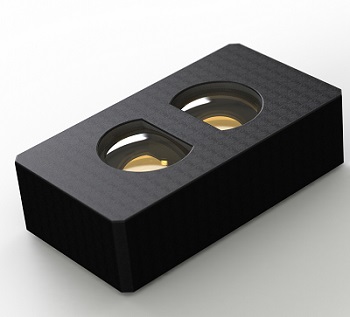SABIC introduced a major breakthrough in the production of infrared (IR) optical sensor lenses for proximity sensing and gesture recognition in smartphones and other electronics applications using its EXTEM™ thermoplastic polyimide (TPI) resin at NPE 2018. SOPROD SA, a Swiss molding company, selected the high-performance SABIC material, which features IR transparency, to mass-produce sensor lenses using micromolding with a multi-cavity tool. Efficient, high-volume molding of EXTEM™ resin can deliver multiple advantages over grinding and polishing of quartz glass and curing of epoxy resin. These benefits can include speed, consistently high quality and the avoidance of costly secondary operations. SOPROD’s achievement offers the electronics industry a new and highly efficient solution to meet accelerating demand for IR optical sensors.
SABIC material’s high flow and low shrinkage make it well suited for mass producing small, precise parts. Further, it can withstand the high temperatures of lead-free soldering commonly used in device assembly. IR optical sensors are widely used to add new functionality in consumer electronics – from phones to video game controllers and even drones. SABIC's collaboration with SOPROD demonstrates the advantages and feasibility of micromolding IR optical lenses from EXTEM™ resin. With this new method, customers in the electronics industry can quickly produce the components required to develop true next-generation devices.

IR Transparency and High-temperature Capability
EXTEM™ resin can deliver key optical properties needed in IR sensor lenses. These include IR transparency, high refractive index, low haze and no surface defects. EXTEM™ resin is available in natural and black, with the black color absorbing visible light but transmitting IR light, which helps increase accuracy for proximity sensing.
The resin's extreme high temperature capabilities (glass transition temperature of 267⁰C / 513⁰F) provide the opportunity for use in lead-free reflow soldering processes, which are popular for assembly of miniaturized device components.
EXTEM™ resin also surpasses epoxy and glass in design flexibility. The SABIC material can be injection molded into lenses with freeform surfaces, while epoxy has geometric limitations and usually needs a substrate layer. Its high shear thinning properties facilitate mold filling, which is essential for small, high-precision parts. The design freedom and the higher refractive index allow the elimination of 1 or 2 layers in an advanced lens design compared to an epoxy solution.














